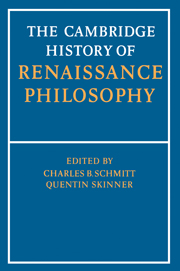Book contents
- Frontmatter
- Introduction
- PART 1 THE INTELLECTUAL CONTEXT
- PART 2 PHILOSOPHY AND ITS PARTS
- 6 Logic and language: Traditional logic
- 7 Logic and language: Humanistic logic
- 8 Natural philosophy: Traditional natural philosophy
- 9 Natural philosophy: The new Philosophy of nature
- 10 Natural philosophy: Astrology and magic
- 11 Moral philosophy
- 12 Political philosophy
- 13 Psychology: The concept of psychology
- 14 Psychology: The organic soul
- 15 Psychology: The intellective soul
- 16 Metaphysics
- 17 Problems of knowledge and action: Fate, fortune, providence and human freedom
- 18 Problems of knowledge and action: Theories of knowledge
- 19 Problems of knowledge and action: Epistemology of the sciences
- 20 Philosophy and humanistic disciplines: Rhetoric and poetics
- 21 Philosophy and humanistic disciplines: The theory of history
- PART 3 SUPPLEMENTARY MATERIAL
- Biobibliographies
- Bibliography
- Index nominun
- Index rerum
- References
21 - Philosophy and humanistic disciplines: The theory of history
from PART 2 - PHILOSOPHY AND ITS PARTS
Published online by Cambridge University Press: 28 March 2008
- Frontmatter
- Introduction
- PART 1 THE INTELLECTUAL CONTEXT
- PART 2 PHILOSOPHY AND ITS PARTS
- 6 Logic and language: Traditional logic
- 7 Logic and language: Humanistic logic
- 8 Natural philosophy: Traditional natural philosophy
- 9 Natural philosophy: The new Philosophy of nature
- 10 Natural philosophy: Astrology and magic
- 11 Moral philosophy
- 12 Political philosophy
- 13 Psychology: The concept of psychology
- 14 Psychology: The organic soul
- 15 Psychology: The intellective soul
- 16 Metaphysics
- 17 Problems of knowledge and action: Fate, fortune, providence and human freedom
- 18 Problems of knowledge and action: Theories of knowledge
- 19 Problems of knowledge and action: Epistemology of the sciences
- 20 Philosophy and humanistic disciplines: Rhetoric and poetics
- 21 Philosophy and humanistic disciplines: The theory of history
- PART 3 SUPPLEMENTARY MATERIAL
- Biobibliographies
- Bibliography
- Index nominun
- Index rerum
- References
Summary
‘What is history?’ has been a controversial question from antiquity down to the present, but it was never more vigorously discussed than in the Renaissance (‘Che cosa sia storia?’ asked Dionigi Atanagi in 1559; eight years later Giovanni Viperano, ‘Quid sit historia?’ and still a quarter-century after that Tommaso Campanella, ‘Quid historia sit?’). Then, as before and since, answers ranged widely – from simple happenings (res gestae) to God's ‘grand design’, from a lowly ‘art’ to an elaborate ‘science’, from a vague ‘sense’ to the ‘most certain philosophy’ (certissima philosophia, in the phrase of Andrea Alciato) and indeed to a position, according to Jean Bodin, ‘above all sciences’. ‘History’ could be objective or subjective, could refer to the past or merely to the memory thereof, to ancient testimony or modern reconstruction; but in the fifteenth and sixteenth centuries it rose grandly in the scale of western learning. Through the classical revival it became a liberal art and a literary genre; through the Reformation it became a surrogate for the tradition of ‘true religion’; through Counter-Reformation controversy it became a highly organised science. In various ways history became a dominant mode of expression and argument in the later sixteenth century, and its significance for the contacts with philosophy increased accordingly.
- Type
- Chapter
- Information
- The Cambridge History of Renaissance Philosophy , pp. 746 - 762Publisher: Cambridge University PressPrint publication year: 1988
References
- 5
- Cited by



